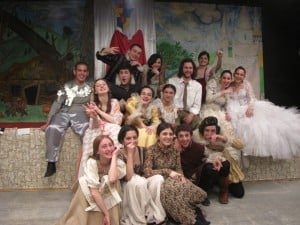 My Fulbright grant lasted nine months; however, my Fulbright story is a bit longer.
My Fulbright grant lasted nine months; however, my Fulbright story is a bit longer.
It’s tempting to think of my Fulbright year as my story. In a sense, it was and is. But it’s important to step back and remember that what I may consider my own story – complete with a beginning, middle and an end – is also just another chapter in a larger, ongoing story. You might say I made my contribution to a fictional periodical entitled Educational Exchange, published on an annual basis by the (also fictional) Fulbright Press since 1946. You would find it on the ‘Mutual Understanding’ shelf located in a back corner of the Library of Congress.
I’ve been back in the United States for eight months. Recently, however, I’ve been reminded that like that ongoing collection of Fulbright stories, mine doesn’t have an ending; at least not yet.
My initial decision to apply for a Fulbright English Teaching Assistantship to Georgia was inspired by one of my professors who happened to have been born and raised there. She first came to the United States on a graduate school fellowship. Years later, she was tickled to inspire an American graduate student of her own to pursue a Fulbright grant in Georgia. Here, we see the first bridge connecting a story I might consider my own, to a larger story to which I’m simply adding my piece.
My signature project as a Fulbright English Teaching Assistant in Georgia was leading a full production of an English-language play with a cast of 15 teenage students titled Beauty IS a Beast, a fairy tale set in an ancient kingdom featuring two princesses, one of whom was homely and sweet, the other, beautiful and vain. The latter sister learns a few things about true beauty when a prince from the neighboring kingdom pays a visit. Pulling together such an effort was no small task, but these students had the talent to match the challenge. I remember clearly the day I discovered some of those students could sing in English better than I could speak it.
I had three goals for the project. First, no matter what the end result, I wanted those students to have a positive experience. Subordinate to achieving the first goal, I hoped that we would put on a good show. Third, of course, I hoped their English language skills would improve as a result of preparing for the performances. Three weeks after those 15 students took a bow on the night of our final performance I left Georgia knowing that I could say with confidence that at least those first two goals had been achieved.
I thought that was the end of my Fulbright story. I was wrong.
One of those 15 students was also a member of Georgian teen pop group called CANDY. Months later, her group went on to win the 2011 Junior Eurovision contest. In their subsequent interviews, two members of that group responded in Georgian. Another two responded in Russian. My student spoke English. Good English.
Goal number three, check. But the story still wasn’t over.
I had a Georgian professor in the United States. Then, I became an American teacher in Georgia. And just like my Georgian professor never expected to inspire one of her American students to go to Georgia, I never expected that I’d end up inspiring one of my Georgian students to go to America. But that’s exactly what happened.
Another one of my 15 students won a scholarship to spend a year at an American high school. My former student had an American teacher in Georgia. Now, she’s a Georgian student in the United States. I can’t help but smile – in my own way – any time I hear Elton John’s ‘Circle of Life.’
My former student has done more than just go to class here in the States. Five months after taking her final bow on our stage in Georgia, this student auditioned for a school play in suburban Virginia. She made the cut. On stage, she played a foreign spy. Off the stage, she’s been playing a different role; the forward bridge in an ongoing cycle of teaching, learning and understanding.
I don’t presume to take credit for the accomplishments of my former students, but I know that I’ve played some small part in their story. For those of you interested applying for a Fulbright English Teaching Assistantship, you’ll become an assistant teacher. You’ll leave with a wonderful story of your own and that story may well end up being longer than you think. You’ll also become a partial author of a larger, ongoing story, filed under ‘Mutual Understanding.’
Photo: Chase Stoudenmire, 2010-2011, Fulbright English Teaching Assistant to Georgia (back row, fifth from left in light brown tie), celebrating with the cast of students from Kutaisi Public School #3 after their final performance of “Beauty IS a Beast” at the Aleksi-Meskhishvili Theater in Kutaisi, Georgia
Want to hear more about Chase’s Fulbright English Teaching Assistantship to Georgia? Click here to hear an NPR interview featuring his Georgian University of Arkansas Professor Kate Mamiseishvili and Chase discussing his experiences.
